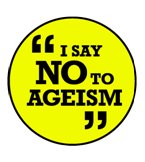Prejudice And
Discrimination Against Older People In Current Society and Effect Of Ageism On
Their Health

Статья
посвящена явлению возрастной дискриминации в обществе и проблемам со здоровьем,
которые могут быть вызваны этой дискриминацией
All
societies use gender and age to classify their members. American people have
developed "a set of prejudices and discriminations against our elders that may
be unequaled by any other society” (Palmore 1999 p. 4). The modern society has
acquired a negative attitude towards older individuals. This negative attitude towards
older generation is reflected in such spheres of modern life as media, language
and humor. For instance, such a phrase as "don’t be an old fuddy-duddy” denotes
that old people are treated as physically defective and "incompetent” (Woolf
1998). Or, for example, the whole industry of the greeting cards business is
"built around "over the hill” theme” (Nelson 2002 p. ix). The message of those
cards portrayed as humorous is rather simple. The essence of it is an intention
and undesirability to get older. Older people are usually given unflattering
characteristics. They are considered to be of little value, even a burden of
society; they are slow to accept changes and are often politically
conservative. Besides, the majority of older people are interpersonally and
economically dependent. And in addition to these features of older generation,
many people consider them to be "slow, deaf or stupid, non-sexual and alienated”
(SOA Watch 2010). Both men and women can feel prejudiced attitude, but women
usually suffer it to a greater extent more than men (Lukas 2010). This negative
attitude towards older people is called ageism. That is "a form of
discrimination which is based on someone's chronological age” (Smith 2010).
Ageism may concern a representative of any age group. However, it mainly refers
to older people.
There are
several reasons of that negative attitude towards older people. Thus, one of
them is the fear of young people to become the same after several decades. This
psychological base of the fear is rather justified. Being young, attractive and
healthy, a person can do many things and therefore wants to live. But being not
that healthy and physically attractive, a person may find himself or herself
unnecessary, useless and even a nuisance for the other people. As a result,
people fear to become a burden to someone and thus consciously or subconsciously
reject senility.
Besides,
prejudice and discrimination towards older people may appear because older
people are more prejudiced themselves than young people. Modern researches
prove that "older adults lose their inhibitory ability - the capacity to
suppress unwanted or irrelevant information - they find it difficult to
disregard their own stereotypical or prejudicial thoughts” (Melville 2000).
Therefore, older people appear to be more likely to express prejudiced thoughts
even if they do not want to.
Unfortunately
the negative attitude of modern society towards older people cannot but reflect
their physical and emotional health. Suffering from the negative attitude of
young and adult people almost everywhere, older people get frustrated, lose
their emotional balance and as a result their physical health also worsen. Scientists
proved long ago that mental state is directly connected with the physical
well-being of a person. So, feeling the negative attitude every day, older
people may get new diseases.
Older
people’s rights are almost "invisible under international law” (Strengthening
older people’s rights 2010). However no one should forget that older men and
women posses the same human rights as everyone else. The reason to this is that
we were all born equal and the course of time and senility cannot change this
fact.
|  Главная
Главная  Наши работы
Наши работы Мой профиль
Мой профиль Регистрация
Регистрация Выход
Выход Вход
Вход